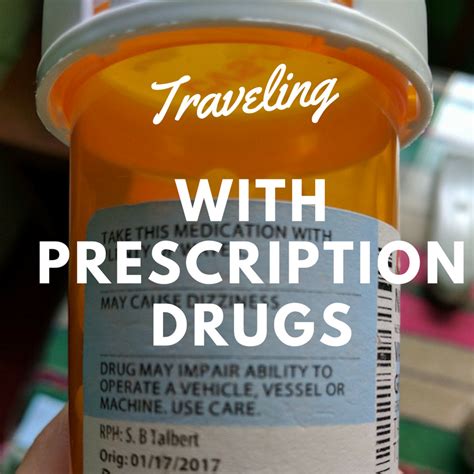5 Tips Traveling Medications

Introduction to Traveling with Medications
When traveling, whether domestically or internationally, it’s essential to consider the medications you take and how to manage them while on the go. This is particularly crucial for individuals with chronic conditions or those who require ongoing medication. In this article, we’ll explore five key tips for traveling with medications, ensuring your health and safety are maintained throughout your journey.
Tip 1: Research and Understand Travel Restrictions
Before embarking on your trip, it’s vital to research the travel restrictions and regulations of your destination country. Certain medications might be banned, restricted, or require special documentation. Understanding these regulations can save you from potential legal issues or health risks. For instance, some countries have strict laws regarding the transportation of prescription drugs, especially narcotics or controlled substances. Always check with the embassy or consulate of your destination country for the most accurate and up-to-date information.
Tip 2: Pack Medications Wisely
Packing your medications correctly is crucial for a smooth and healthy trip. Here are a few tips to keep in mind: - Keep medications in their original packaging to avoid any confusion or issues with customs. - Pack your medications in a carry-on bag in case your checked luggage is delayed or lost. - Bring a copy of your prescription and a list of your medications, including their generic names. - If you have any special storage requirements, such as refrigeration, plan accordingly.
Tip 3: Obtain a Travel Letter from Your Doctor
A travel letter from your doctor can be incredibly helpful, especially if you’re traveling with controlled substances or significant amounts of medication. This letter should: - Explain your medical condition - List your medications - State why you need these medications - Include your doctor’s contact information
Having this documentation can help if you’re questioned by airport security or customs officials about your medications.
Tip 4: Plan for Time Zone Changes and Medication Schedules
Traveling across different time zones can disrupt your medication schedule. It’s essential to plan how you’ll manage your medications when dealing with time changes. Here are a few points to consider: - Consult with your doctor before your trip to discuss how to adjust your medication schedule. - Use a travel app or a world clock to keep track of the time back home and at your destination. - Bring a small clock or watch to help you keep your medication schedule on track.
Tip 5: Stay Healthy While Traveling
Beyond managing your medications, staying healthy while traveling is crucial. Here are some general tips: - Stay hydrated by drinking plenty of water. - Avoid excessive alcohol consumption, as it can interact with your medications. - Eat nutritious meals to maintain your energy levels and overall health. - Get enough rest to help your body adjust to the new environment and any time changes.
| Medication | Original Packaging | Prescription Copy |
|---|---|---|
| Prescription Drugs | Yes | Yes |
| Over-the-Counter Medications | No | No |
📝 Note: Always check the expiration dates of your medications before traveling to ensure you have an adequate supply.
As you prepare for your trip, remembering these tips can make a significant difference in your travel experience. By being prepared and informed, you can ensure that your health is maintained, and you can enjoy your travels without unnecessary stress related to your medications.
In wrapping up, the key to successful travel with medications lies in preparation, understanding regulations, and maintaining your health. Whether you’re traveling for leisure or business, prioritizing your health ensures that you can fully enjoy your trip. By following these tips and staying mindful of your medication needs, you can have a safe, enjoyable, and healthy travel experience.
What should I do if I forget my medication at home?
+
If you forget your medication, contact your doctor immediately. They can provide guidance on what to do next, which might include prescribing a replacement or advising on where to find a temporary supply at your destination.
Do I need to declare my medications at airport security?
+
It’s a good idea to inform security about your medications, especially if they are in liquid form or if you have any medical devices. However, the specific requirements can vary, so it’s best to check with the airline or the Transportation Security Administration (TSA) for the most current guidelines.
Can I travel with my medications in a pill box?
+
While it’s convenient to use a pill box for daily medication management, it’s recommended to keep your medications in their original packaging when traveling, especially for prescription drugs. This can help avoid any confusion or issues with customs or security.